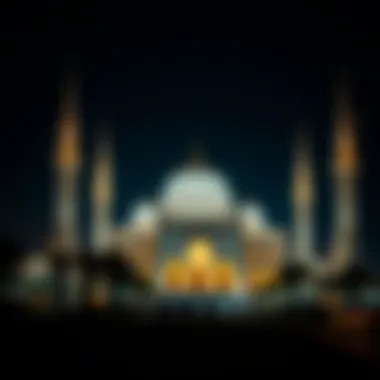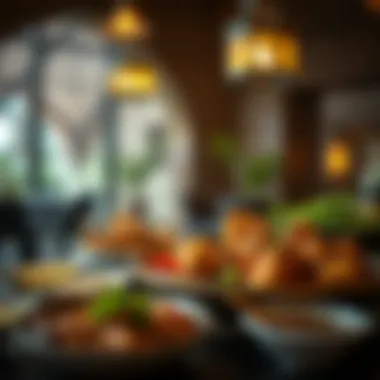Ramadan Timing in UAE 2024: Detailed Insights


Intro
As the crescent moon emerges, signaling the onset of Ramadan, many across the United Arab Emirates prepare for a month filled with solemn reflection and vibrant cultural practices. Ramadan is not merely about fasting; it's an opportunity for spiritual growth and a chance to strengthen community bonds. Institutions, families, and individuals often adjust their routines and embrace new norms during this holy month.
In 2024, the timing of Ramadan is poised to follow the lunar calendar, which is notably sensitive to astronomical conditions. This means that specific dates can shift slightly based on moon sightings. In the UAE, the official start of Ramadan is traditionally determined by religious authorities, which adds a layer of anticipation to the observance each year. For expatriates and residents alike, understanding the precise timing for fasting and prayer becomes essential in navigating daily life and commitments.
The significance of Ramadan extends beyond individual practice; it plays a pivotal role in the cultural landscape of the UAE. With a blend of long-held traditions and modern influences, from Iftar gatherings to charity initiatives, the month creates a unique atmosphere that resonates with both locals and visitors. This article delves into the specifics of Ramadan in 2024, including prayer schedules, fasting hours, and the cultural tapestry that accompanies this meaningful time.
By unfolding the various aspects of Ramadan in the UAE—from historical background to how fasting integrates with everyday routines—readers, particularly real estate agents, investors, expatriates, homeowners, and developers, will glean insights not only about the religious significance of the month but also about its socio-economic implications. Understanding these elements can shed light on current market trends and the effects Ramadan has on the property landscape in the UAE.
Preface to Ramadan
Ramadan is a month of profound significance for Muslims around the globe, serving as a beacon of spirituality, self-discipline, and community. In the context of the United Arab Emirates, it presents a unique tapestry interwoven with both historical richness and vibrant cultural practices. This holy month is not just about fasting; it encapsulates the essentials of faith, reflection, and social responsibility. Understanding the nuances of Ramadan in the UAE, especially for expatriates and real estate investors, can impact daily life and business practices in significant ways.
Historical Significance
The roots of Ramadan are deep and sacred within Islamic tradition. It commemorates the first revelation of the Quran to the Prophet Muhammad, which adds layers of reverence to the practices observed during this time. Historically, this period emphasizes the importance of gratitude, empathy, and spirituality, making it a powerful time for personal and communal reflection.
Ramadan was formally brought to the UAE during the spread of Islam in the 7th century. Over the centuries, it has evolved into a significant month where citizens and residents alike engage in rituals that strengthen their faith and community bonds. The echoes of Islamic history resonate through time, instilling a sense of unity among those who participate each year.
Cultural Importance in the UAE
In the UAE, Ramadan transcends mere fasting; it is a celebration of cultural identity. From communal prayers held in grand mosques to the delightful aroma of traditional dishes wafting through homes during Iftar, every aspect reflects the rich cultural ethos of the Emirati people.
During this month, the spirit of giving is palpable as families come together to break their fasts, reflecting a strong sense of community. Iftar gatherings are not only a time for family but are often extended to friends and colleagues. The act of sharing food, such as dates and specially prepared dishes like Harees and Al Majed, symbolizes generosity and hospitality, vital components of Emirati culture.
Further, Ramadan in UAE showcases the blending of modernity and tradition. Expatriates, who make up a significant portion of the population, contribute to the diverse observances of the month, infusing global practices with local traditions. This melting pot of cultures creates an environment where everyone from real estate agents to tourists can witness a festive atmosphere like no other.
"Fasting is not just about abstaining from food and drink. It is about enriching the heart and spirit."
For those involved in the real estate sector, understanding Ramadan's cultural implications can guide business interactions and client relationships. Recognizing the importance of timings and respecting local customs can create a more harmonious living experience for expatriates and investors alike.
In sum, the introduction to Ramadan paints a vivid picture of a month filled with historical significance and cultural depth, making it essential for all to embrace its lessons and blessings.
Ramadan Timing
Ramadan is a month that holds a special place in the hearts of Muslims worldwide. For residents of the UAE, understanding the timing of this holy month is not just beneficial; it's essential. Knowing when to start and break fast, when to pray, and how daily routines shift can shape the entire experience of Ramadan. This year, 2024 brings with it unique schedules and observances that are important for both long-time residents and newcomers alike.
Start and End Dates
In 2024, Ramadan is expected to commence in the evening on March 10, with the first full day of fasting on March 11. It will conclude on April 9, rounding out the 30-day observance, which culminates in Eid al-Fitr—a day of celebration and festivity. However, it’s crucial to note that the exact timing can vary. The Islamic calendar is lunar, meaning the sighting of the moon determines the beginning and end of Ramadan. Thus, local mosques and authorities will announce the dates based on actual sightings, so it's wise to keep an ear out or check announcements from reputable sources like local authorities or mosque notifications.
Daily Fasting Schedule
The daily fasting schedule is central to Ramadan, as it dictates the times when one must abstain from food and drinks. The fasting day starts just before the Fajr prayer and continues until the Maghrib prayer, which marks the end of the daily fast.
Suhoor Timing
Suhoor is the pre-dawn meal consumed before the fasting day begins. In 2024, the recommended time for Suhoor will end at around 5:20 AM, just before the Fajr prayer. This meal is not merely a ritual; it plays a key role in sustaining energy throughout the long hours of fasting. A nutritious Suhoor, rich in whole grains, proteins, and hydration, sets the tone for the day ahead.
Eating well during this time can help mitigate the fatigue and thirst that typically accompany fasting. However, it's important to avoid overly salty or sugary foods, as they can lead to increased thirst later in the day.


Iftar Timing
Iftar, the evening meal that breaks the fast, typically commences at the time of the Maghrib prayer, which in 2024 will be around 6:20 PM. This moment is laden with communal significance. Families often gather around the table, sharing this special time together, often starting their meal with dates and water—a tradition rooted in the practices of the Prophet Muhammad.
The Iftar meal can vary widely depending on cultural traditions but usually includes a variety of foods that reflect the rich culinary diversity of the UAE. While it's a time of feasting, care should be taken to eat mindfully. Starting slow is advisable to prevent discomfort after a long day of fasting.
"In the hustle and bustle of daily life, Ramadan reminds us to pause, reflect, and connect with our faith and community."
Understanding these timings not only enhances one's spiritual experience during Ramadan but also integrates smoothly into daily life, particularly for expatriates and those new to the region. Therefore, it’s important to keep these timings in check and to plan meals appropriately—both for health and for engaging in the spirit of this holy month.
Prayer Times during Ramadan
Understanding prayer times during Ramadan is integral to the experience of fasting and worship. The timings not only outline the schedule of religious observance but also shape the daily rhythm of life for Muslims during this holy month. In the UAE, where a significant portion of the population observes Ramadan, these prayer times guide both personal routines and community engagements.
Fasting during Ramadan is more than abstaining from food and drink; it encompasses spiritual reflection, increased devotion, and worship. Knowing when to pray complements the fasting experience, allowing practitioners to align their spiritual and physical needs seamlessly.
Fajr Prayer
The Fajr prayer kicks off each day’s fast in Ramadan, marking the break of dawn. Observants have a brief window between dawn and the call to prayer to have their final meal, known as Suhoor. The timing of Fajr can shift slightly each day due to the changing lengths of daylight during the month.
In 2024, for instance, Fajr is expected to occur around 5:00 AM early in Ramadan and gradually move to about 4:45 AM towards the end. This change necessitates careful attention for those partaking in Suhoor to ensure they complete their meal before the initiation of fasting. Missing this window isn't just an inconvenience; it underscores the importance of vigilance and preparation during this sacred time.
Dhuhr Prayer
Once the sun fully rises, the Dhuhr prayer provides an important break in the day. Observing this prayer while fasting offers a moment for spiritual renewal amidst the day’s challenges. Knowing the Dhuhr timing—around noon in many areas—can help individuals pause and refocus their thoughts and actions back toward their faith.
In UAE cities like Abu Dhabi and Dubai, Dhuhr is expected to fall around 12:30 PM. This moment isn’t just about the act of prayer; it's also a daily reminder of the discipline fasting requires and the spiritual connection fostered during Ramadan.
Asr Prayer
As the day proceeds, the Asr prayer comes mid-afternoon, often around 3:00 PM. This prayer serves as an important transition, providing another opportunity for reflection and devotion. For those fasting, Asr carries the added significance of urging individuals to maintain their commitment and patience until sunset, when the fast will be broken.
During Ramadan, the Asr prayer can be seen as a checkpoint. It connects the earlier prayers to the impending moment of reward that comes with breaking the fast, demanding awareness and mindfulness about managing the body's energy levels.
Maghrib Prayer
Maghrib signifies the conclusion of the daily fast. Coinciding with sunset, it is the moment when families gather around the table to break their fast, often starting the meal with dates and water. The timing is generally around 6:45 PM but can vary as sunset changes day by day.
This prayer not only marks the end of a day of fasting but also fosters community as individuals often break their fast together at home or in communal Iftars. This social component of Maghrib highlights the collective spirit of Ramadan, reinforcing bonds among family and friends.
Isha Prayer
The last prayer of the day during Ramadan is the Isha prayer, which generally occurs around 8:00 PM. This prayer can also be accompanied by the Taraweeh, which consists of additional units of prayer specifically performed during Ramadan nights.
Participating in Isha, especially when mingled with Taraweeh, deepens one’s spiritual experience. It is a time for elaborate recitations from the Quran, and it encourages a greater sense of community, as mosques often overflow with worshippers united in their faith.
"Prayer times during Ramadan are not merely a schedule; they represent the heart of a shared spiritual journey, breathing life into the day-to-day routines of the faithful."
Observances and Traditions
The observance of Ramadan goes beyond fasting; it encompasses a rich tapestry of traditions and community practices that breathe life into the holy month. For many in the UAE, these traditions serve as a vital link to their heritage, reinforcing not only spiritual values but also social bonds. From communal meals to charitable initiatives, these observances shape the fabric of daily life during Ramadan. Understanding their importance reflects a broader grasp of how Ramadan unfolds in a modern, multicultural society.


Community Iftar Gatherings
One of the most cherished rituals during Ramadan is the Iftar gathering, where families, friends, and even strangers come together to break their fast. The aroma of traditional dishes fills the air as the sun sets, creating a communal atmosphere that transcends personal differences. In numerous neighborhoods across the UAE, you can find community-organized Iftars that welcome all, regardless of their background.
This sense of togetherness isn’t merely about sharing food. It emphasizes compassion, hospitality, and unity. For expatriates, these gatherings provide an opportunity to connect with local culture and fellow residents, enriching their experience of living in the UAE. Notably, hotels and restaurants often showcase special Iftar menus, enhancing culinary exploration while fostering communal spirit.
Charitable Activities
Another significant aspect of Ramadan in the UAE is the act of giving. Known as Zakat (almsgiving), many Muslims choose this holy month to fulfill their charitable obligations. Various organizations orchestrate initiatives such as food drives, clothing collections, and donation campaigns aimed at supporting those in need.
These charitable activities are double-edged: they provide essential help to underprivileged communities while also fulfilling a spiritual duty. Engaging in such acts can lead to a profound sense of fulfillment and connection to the broader community. Some organizations even organize Iftar meals for the less fortunate, ensuring everyone can partake in the breaking of the fast. This practice not only showcases the spirit of empathy but also reinforces the UAE’s commitment to humanitarian values.
Cultural Events during Ramadan
During Ramadan, the UAE transforms into a cultural hub, showcasing a blend of traditional and modern activities. Festivals, night markets, and exhibitions are organized, offering activities that cater to both adults and children. Events like the Ramadan Night Market feature artisans selling handcrafted goods, along with cultural demonstrations, live music, and food stalls that tempt the senses.
In addition to the festive activities, spiritual programs, like Quran recitations and lectures, provide deeper insights into the significance of Ramadan. These cultural events are more than mere entertainment; they serve as a platform for education regarding customs and traditions. They promote interaction among diverse communities, fostering mutual respect and understanding.
"The beauty of Ramadan lies in its ability to unite hearts, transcending borders and cultures."
By engaging in these observances and traditions, the UAE exemplifies a unique blend of spirituality and sociability, making the Ramadan experience unforgettable for both locals and visitors alike. Whether partaking in communal meals, giving selflessly, or immersing oneself in cultural festivities, these elements collectively enrich the holy month, promoting harmony and togetherness in a vibrant tapestry of life.
Impact on Daily Life
The holy month of Ramadan brings changes that ripple through various aspects of daily living in the UAE. It’s more than just a time for fasting; it redefines social norms, work structures, and even transportation dynamics. For both residents and expatriates, understanding these shifts is crucial.
Adjustments to Work Schedules
During Ramadan, firms usually adapt their working hours to accommodate fasting schedules. The labor law stipulates that the working day is shortened, typically by two hours. This shift allows employees to finish their tasks earlier, facilitating a smoother transition into the evening's observances. For instance, if the typical 9 to 5 becomes 9 to 3, it helps people get home before iftar, making it easier for workers to join family or friends for the breaking of the fast.
However, not all sectors are uniformly affected. Industries like hospitality and retail, which see an uptick in activity after sunset, may alter their schedules differently to balance supply and demand. Managers might have to reassess shift patterns to ensure efficiency while respecting their workforce’s fasting commitments. The result? A delicate but often necessary balancing act in scheduling that aims to blend productivity with observance.
Changes in Social Activities
Social life in the UAE transforms dramatically during Ramadan. Many cafes and restaurants shift from daytime service to evening and night operations. Community venues that promote gathering for iftar dinners become hubs of social interaction. For many, this is a time to reconnect with family, friends, and colleagues over meals, sharing a myriad of dishes from local delicacies to international cuisine.
Also, be prepared for a more subdued atmosphere during the day. Many public spaces may be quieter as people respect the fasting hours. This period becomes particularly special as diverse communities come together, highlighting a blend of cultures and traditions amid the common goal of spiritual growth.
In this essence, the societal rhythm changes, adopting a more reflective and communal nature. It’s a period where generosity and acts of kindness are elevated, with an upsurge in charitable events inviting people to contribute to local initiatives or lend a helping hand.
Traffic and Transportation Adaptations
As daily activities change, so do traffic patterns. The rush hour becomes pretty different, particularly as the evening approaches. Just before iftar, the roads often get congested as people head home for dinner. Those needing to travel during these hours should factor in extra time, preparing for potential delays.
In response, the local authorities often implement measures to ease congestion. These may include adjusting traffic light sequences and deploying additional public transport services to accommodate commuters. Residents are encouraged to utilize public transit systems that link central areas with popular iftar venues to reduce personal vehicle use during peak times.
"Understanding the pulse of the city during Ramadan is essential for planning effectively, whether it’s for work or social engagements."
In essence, while Ramadan may come with its challenges concerning daily life, it also offers rich opportunities for building relationships, experiencing cultural exchanges, and promoting community cohesion. Understanding these dimensions can significantly enhance one’s experience during this sacred time.
Health Considerations during Ramadan


Understanding the health implications of Ramadan is crucial, especially for those engaged in observing the fast while maintaining their daily routines and responsibilities. Fasting for an entire month can pose unique challenges, yet it also offers benefits like improved discipline and a chance to reflect on one’s lifestyle choices. Thus, comprehension of this topic helps one navigate the month with poise and balance.
Nutrition Advice for Fasting
Choosing the right foods during Suhoor (the pre-dawn meal) and Iftar (the evening meal) is pivotal for sustaining energy throughout the day. Here are several points to keep in mind:
- Complex Carbohydrates: Opting for whole grains, like brown rice and whole-wheat bread, can supply a steady release of energy.
- Protein Sources: Including lean proteins, such as grilled chicken, legumes, and fish, can help maintain muscle mass and keep one feeling full for longer.
- Fruits and Vegetables: Eating a variety of colorful fruits and vegetables ensures essential vitamins and minerals are consumed. These not only boost the immune system but also help with hydration.
It's advisable to avoid heavy, fried foods and limit sugars during these meals. A balanced intake promotes better energy levels and overall comfort throughout the fasting experience.
Managing Hydration
Staying hydrated is vital during Ramadan, especially because fasting hours can extend in warmer months. Here are tips for maintaining hydration:
- Drink Plenty During Non-Fasting Hours: Aim for at least 2-3 liters of water between Iftar and Suhoor.
- Electrolytes Matter: Consuming natural sources of electrolytes like coconut water or homemade smoothies can help replenish lost minerals.
- Limit Caffeine: Be cautious with caffeine intake as it can lead to dehydration. If necessary, ration coffee or tea and ensure additional water is consumed.
Above all else, listening to one’s body in terms of hydration needs is essential. Thirst signals should not be ignored, especially as the body becomes accustomed to fasting again.
Exercise During Ramadan
Engaging in physical activity during Ramadan can be tricky due to the altered daily schedule. However, with some consideration, one can maintain fitness levels:
- Timing is Key: Plan workouts for the evenings, either right before Iftar or about an hour after, to ensure that hydration and energy are available during and after exercise.
- Opt for Lighter Activities: Choosing moderate activities such as walking or light stretching is advisable, especially in the initial days of fasting.
- Listen to Your Body: Fatigue levels can vary while fasting, so it's important to adapt workouts accordingly, possibly reducing intensity or duration.
Engaging in fitness during this period can uplift mood and ward off stress, making it a valuable part of the day.
Balancing nutrition, hydration, and exercise can significantly enhance the fasting experience in Ramadan, paving the way for a healthier month.
For additional reading and resources on healthy fasting practices, consider checking out The World Health Organization for comprehensive health insights.
The End
As Ramadan draws to a close, it marks a pivotal moment for reflection and community bonding within the UAE. This conclusion not only encapsulates the multifaceted observances of the holy month but also emphasizes their significance in the cultural and spiritual fabric of the nation.
Recap of Ramadan Observances
Throughout this illuminating exploration of Ramadan, we have delved into various aspects of the month that resonate deeply within the UAE. The sacred act of fasting, beginning at dawn with Suhoor and culminating in the evening with Iftar, brings together families and friends to share meals and stories.
- Timing and Rituals: Each day's rhythm shifts, dictated by prayer times and fasting schedules, fostering a sense of unity among participants. The tradition of daily prayers further cements this communal landscape, encouraging spiritual growth and reflection.
- Cultural Engagement: Observances such as community Iftar gatherings and charitable initiatives showcase how Ramadan serves not just as a personal journey but also as a collective celebration of generosity and compassion. Many expatriates and residents engage in acts of charity, often participating in food drives or distributing Iftar meals to those in need.
The cultural importance during this period cannot be overstated. The essence of Ramadan extends beyond merely abstaining from food and drink—it molds the social demeanor of communities, with events filled with an atmosphere of giving and cooperation.
In addition, the unique blend of traditional practices and modern festivities creates a rich tapestry of experiences. From cultural events organized in public spaces to interfaith dialogues, the UAE showcases its commitment to diversity and inclusion during this period.
Looking Forward to
As we gear up for Ramadan in 2024, there’s much to anticipate. With the lunar calendar determining the exact timing, the excitement is palpable among the UAE's residents and visitors alike. Residents can look forward to experiencing Ramadan anew, with many engaging in planning their months ahead of time, particularly concerning work schedules, family gatherings, and community events.
The UAE’s evolving landscape will likely influence Ramadan's observance this coming year.
- Increased Charitable Opportunities: Organizations and communities are expected to ramp up efforts to host Iftar events and charitable partnerships, further enhancing the spirit of charity.
- Cultural Programs: With a continually diverse demographic, there’s an open door for enriching cultural programs that embrace various denominations while celebrating shared values.
Keeping in mind the ongoing global challenges we face, such as health and social issues, the adaptable nature of the UAE’s communities will continue to shine brightly this Ramadan. Optimism surrounds collective efforts to ensure that Ramadan becomes a catalyst for change, growth, and healing.
As such, those in real estate, investment, and expatriation can expect to see not just an uptick in community engagement but also a nurturing environment conducive to fostering relationships and understanding between different cultures.
In summary, the essence of Ramadan in the UAE amplifies every year, inviting all to fill their hearts and minds with compassion, understanding, and benevolence. These reflections paint a hopeful picture that transcends mere observances, calling for a deeper connection within each community, instilling lasting change for the better.











